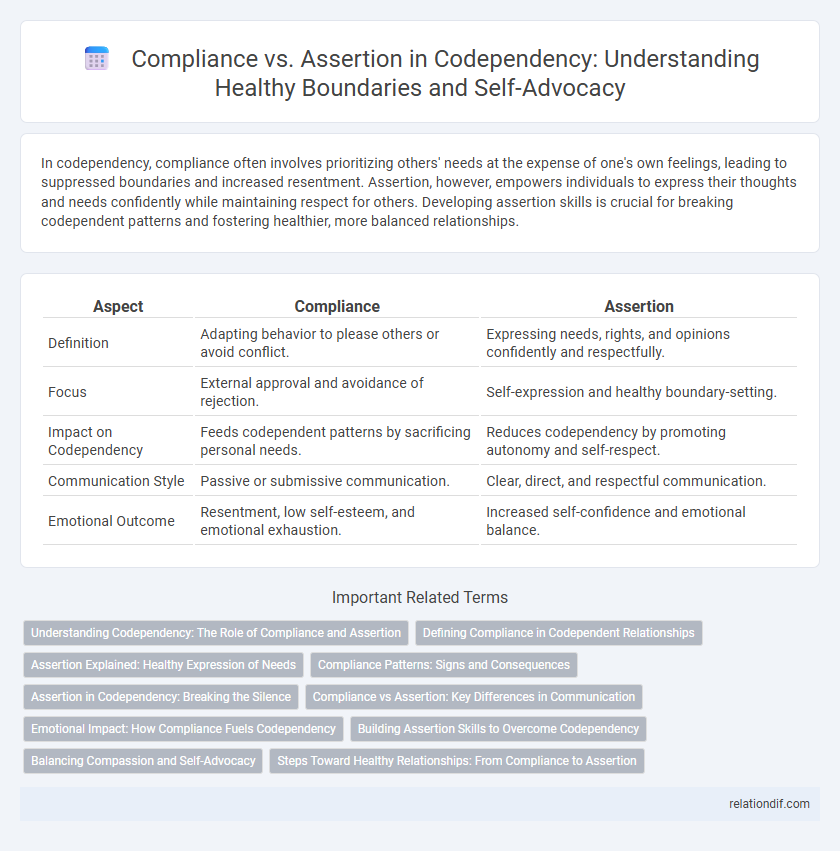In codependency, compliance often involves prioritizing others' needs at the expense of one's own feelings, leading to suppressed boundaries and increased resentment. Assertion, however, empowers individuals to express their thoughts and needs confidently while maintaining respect for others. Developing assertion skills is crucial for breaking codependent patterns and fostering healthier, more balanced relationships.
Table of Comparison
| Aspect | Compliance | Assertion |
|---|---|---|
| Definition | Adapting behavior to please others or avoid conflict. | Expressing needs, rights, and opinions confidently and respectfully. |
| Focus | External approval and avoidance of rejection. | Self-expression and healthy boundary-setting. |
| Impact on Codependency | Feeds codependent patterns by sacrificing personal needs. | Reduces codependency by promoting autonomy and self-respect. |
| Communication Style | Passive or submissive communication. | Clear, direct, and respectful communication. |
| Emotional Outcome | Resentment, low self-esteem, and emotional exhaustion. | Increased self-confidence and emotional balance. |
Understanding Codependency: The Role of Compliance and Assertion
Codependency often involves a struggle between compliance and assertion, where individuals prioritize others' needs over their own emotional boundaries, leading to excessive people-pleasing behaviors. Compliance in codependency manifests as chronic submission and difficulty expressing true feelings, while assertion is essential for establishing healthy boundaries and fostering self-respect. Understanding the balance between these behaviors is crucial for breaking codependent patterns and achieving emotional autonomy.
Defining Compliance in Codependent Relationships
Compliance in codependent relationships refers to an excessive need to meet others' demands or expectations at the expense of one's own needs and boundaries. This behavior often stems from fear of rejection or conflict, leading to passive acceptance rather than honest communication. Individuals exhibiting compliance may struggle with self-assertion, sacrificing personal autonomy to maintain approval and connection.
Assertion Explained: Healthy Expression of Needs
Assertion involves expressing needs and boundaries clearly and respectfully, fostering healthy communication and self-respect in relationships. It contrasts with compliance, where individuals often suppress their needs to avoid conflict or gain approval, leading to imbalance and resentment. Practicing assertion encourages emotional honesty and empowerment, essential components in overcoming codependency.
Compliance Patterns: Signs and Consequences
Compliance patterns in codependency often manifest as an excessive need to please others, difficulty expressing personal opinions, and a tendency to prioritize others' needs over one's own. Signs include chronic people-pleasing, fear of rejection, and suppressing true feelings to avoid conflict. Consequences of prolonged compliance can lead to low self-esteem, emotional burnout, and a blurred sense of identity.
Assertion in Codependency: Breaking the Silence
Assertion in codependency involves expressing one's needs and boundaries confidently, challenging the typical pattern of compliance that suppresses personal voice. Breaking the silence through assertion empowers individuals to reclaim autonomy and fosters healthier relationships by promoting honest communication. Developing assertiveness skills is crucial for overcoming codependent tendencies and establishing emotional independence.
Compliance vs Assertion: Key Differences in Communication
Compliance in communication often involves yielding to others' demands or expectations to maintain harmony, typically seen in codependent relationships where self-suppression is common. Assertion, contrastingly, emphasizes expressing personal needs and boundaries clearly and confidently without aggression, fostering healthy interactions. Recognizing the difference between compliance and assertion is vital for overcoming codependency and establishing balanced, respectful communication patterns.
Emotional Impact: How Compliance Fuels Codependency
Compliance in codependency often leads to suppressed emotions and unmet needs, intensifying feelings of resentment and low self-worth. Constantly yielding to others' demands erodes personal boundaries, causing emotional exhaustion and a diminished sense of identity. This dynamic perpetuates a cycle where emotional dependency deepens, reinforcing the need for external approval over self-assertion.
Building Assertion Skills to Overcome Codependency
Building assertion skills is essential for overcoming codependency by empowering individuals to express their needs and boundaries clearly and confidently. Practicing assertiveness helps replace patterns of excessive compliance, reducing feelings of resentment and enabling healthier interpersonal relationships. Strengthening assertion promotes emotional independence and fosters mutual respect, vital components in breaking free from codependent dynamics.
Balancing Compassion and Self-Advocacy
Balancing compassion and self-advocacy in codependency requires distinguishing compliance from assertion by maintaining personal boundaries while empathetically engaging with others. Compliance often leads to sacrificing one's needs to please others, whereas assertion involves expressing feelings and needs honestly without guilt. Developing assertiveness skills fosters healthy relationships by promoting mutual respect and preventing emotional exhaustion often seen in codependent dynamics.
Steps Toward Healthy Relationships: From Compliance to Assertion
Shifting from compliance to assertion involves recognizing personal boundaries and expressing needs clearly without fear of rejection or conflict. Developing assertive communication skills requires practicing honesty, self-respect, and empathy, which fosters mutual understanding and equitable interactions. Consistent assertion replaces codependent patterns with healthier relational dynamics based on autonomy and balance.
Compliance vs Assertion Infographic

 relationdif.com
relationdif.com